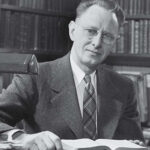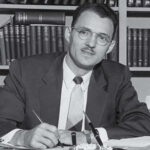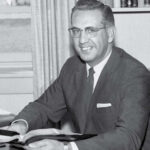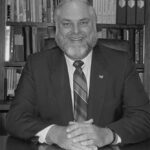As Lancaster Bible College celebrates its 90th year of “educating Christian students to think and live and biblical worldview and to proclaim Christ by serving Him in the Church and society,” it is fitting to look back on LBC’s history and all who made the college what it is today with God’s guidance.
Lancaster Bible College was founded by Henry J. Heydt in September 1933. Eight daytime students and 14 evening students were enrolled in the original class, which met in the Convention Hall at West Orange and Pine Streets in Lancaster. Rev. William J. Randolph (’50) succeeded Heydt as President, and from 1954 to 1961, moved the school toward accreditation. Also in his era, the size of the campus grew, initiated by a gift of land in 1957 from Mr. and Mrs. J. Martin Esbenshade.
In 1961, the school’s academic dean, Dr. Stuart E. Lease (’52), was named President. During his 17-year presidency, the student body grew to more than 400 students, and the campus expanded to 36 acres. In 1973, the school earned provisional approval to grant the degree of Bachelor of Science in Bible, and the school officially became Lancaster Bible College (LBC).
When Dr. Gilbert A. Peterson began his duties as president in 1979, he focused on debt reduction. Within five years, LBC raised more than $500,000 toward financial stability and more than $1.5 million toward the school’s endowment. Additional land was purchased, bringing the campus size to 100 acres.
- LBC’s founder and first President Henry J. Heydt
- LBC’s second president Rev. William Randolph (’50)
- LBC’s third President Dr. Stuart Lease (’52)
- LBC’s fourth President Dr. Gilbert A. Peterson
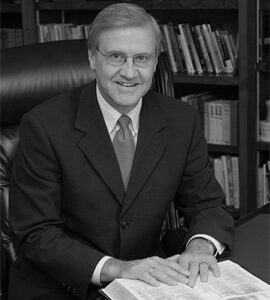
LBC’s fifth President Dr. Peter W. Teague
In 1999, Dr. Peter W. Teague became LBC’s fifth president. During his tenure, Good Shepherd Chapel, Olewine Dining Commons, Peterson Hall, Charles Frey Academic Center and Donald H. Funk Athletic Field were completed. Additionally, the Teague administration added online undergraduate programs and expanded the graduate school to offer terminal degrees.
Also during this time, LBC welcomed the addition of two sites in Washington, D.C., and Philadelphia.
LBC’s location near the nation’s capital builds upon a strong tradition of Bible education and training in the Washington, D.C. area. In 1938, three local Bible institutes merged to form the Washington Bible Institute. Committed to training young people in intensive study of the Bible, the school continued to expand over the years. In 1956, the school became Washington Bible College, and later Capital Bible Seminary was added. In 2012, the academic programs of Washington Bible College and Capital Bible Seminary were merged into Lancaster Bible College, resulting in strengthened program offerings, and the acquisition was approved by the Maryland Higher Education Commission in 2013. As part of LBC | Capital, the Washington, D.C. location continues the legacy of providing biblically based education in the D.C. metro area.
The history of the Philadelphia location can be traced to the Center for Urban Theological Studies (CUTS), founded in 1971 in part by Dr. Bill Krispin and Geneva College. In 2012, LBC | Capital replaced Geneva College as CUTS accreditation partner. With the retirement of CUTS’ president in 2015, LBC | Capital accepted responsibility for the CUTS legacy and its commitment to deliver biblical higher education to Philadelphia students.
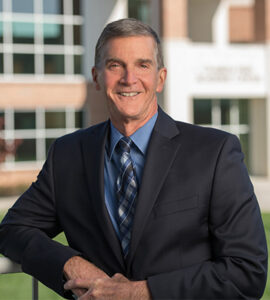
LBC’s sixth President Dr. Thomas L. Kiedis
On February 1, 2020, Lancaster Bible College welcomed its sixth president, Dr. Thomas L. Kiedis. Dr. Kiedis came to LBC from Spanish River Church in Boca Raton, Fla., where he served as senior pastor for 10 years. He was a member of the college’s Corporation since 2012, taught graduate courses as an adjunct faculty member and for six years served as the lead mentor for the church planting concentration of the Master of Arts in Ministry program. Under Dr. Kiedis’ leadership, the college added 25 new online bachelors and masters programs in one calendar year and was named the No. 1 Online Bible College in America.
LBC | Capital is growing all the time, with a main campus at 901 Eden Road in Lancaster, Pa., two sites in major cities and many partnerships, both national and international, including with the Pastors Discipleship Network in Kampala, Uganda, and with Faculdade Teológica Sul Americana (FTSA) in Londrina, Paraná State, southwestern Brazil.
Today, LBC | Capital offers a full range of academic programs, from certificates and associate degrees to bachelor’s, master’s and doctorates, and continues to earn many accolades. And while many things have changed since 1933, one thing hasn’t: our mission to “educate Christian students to think and live a biblical worldview and to proclaim Christ by serving Him in the Church and society.”
